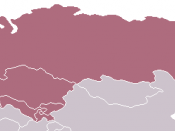The United Nations was established in 1945 after the end of the Second World War. It was established in order to 'ensure world peace and to establish the economic, social and political foundations through which this can be realised' It aimed to achieve three main goals: "to maintain international peace, to develop friendly relations among states, and to cooperate internationally in solving international economic, social, cultural and humanitarian problems and in promoting respect for human rights and fundamental freedoms."
The roots of the UN lay in its predecessor, the League of Nations. The League had failed to provide a solution to settle international disputes emerged and in particular, ineffective in preventing the outbreak of the Second World War. As a result, the UN was established with the aim of giving stronger executive powers to the Security Council in order to improve in maintaining peace and security. However, this expectation was largely challenged and it is widely acknowledged that the UN has failed in this particular aspect.
The determining factors for success or failures lies in whether the UN is believed to have fulfilled its original aims. It is difficult to judge the UN's success on quantitative data such as the number of crises and conflicts. By merely looking at the facts and figures, we are excluding the politics and circumstances of each era. "The organisation's performance has been shaped by the world political context." In examining the extent of its success, we must examine the political context of the world.
Upon establishment, the development of the Cold War posed a serious challenge for the UN. The UN was regarded as weak in dealing with the tensions and conflicts of this period. "During the Cold war, it was paralysed from playing a major role in maintaining international peace and security because...



Good Points.
Good points raised throughout the essay, with many examples to back up each point. Well written, well structured, well done!
7 out of 8 people found this comment useful.